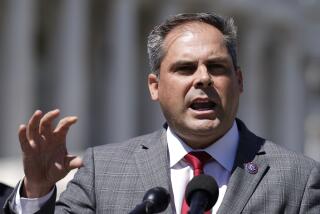Medicaid Fight Threatens Budget
WASHINGTON â A letter signed by 44 House Republicans protesting proposed Medicaid cuts emerged Friday as a serious threat to plans by President Bush and GOP leaders to curtail spending on a range of benefit programs.
The Medicaid fight could hinder Congressâ ability to pass this yearâs budget resolution, which not only sets spending levels for federal programs but also includes a new round of tax cuts and legislation to open the Arctic National Wildlife Refuge to oil drilling.
The House and Senate passed different versions of a fiscal 2006 budget a month ago, with just four votes to spare in the House and two in the Senate. Formal negotiations to write a compromise budget have not begun, but Republican leaders and budget committee chairmen have met to try to work out a deal that could pass both chambers.
Congressional insiders said their job was made more difficult by a letter written by Rep. Heather Wilson (R-N.M.) and signed by 43 other House Republicans. In it, they asked House Budget Committee Chairman Jim Nussle (R-Iowa) to abandon the effort to trim as much as $20 billion from the projected growth in Medicaid over the next five years.
Instead, the 44 Republicans endorsed the creation of a bipartisan commission to look for ways to restructure the program.
Wilson said the states, which run Medicaid jointly with Washington, operate it with a combined 2,500 waivers of the programâs rules. âThat tells me that itâs time to change the rules,â she said.
Her position is popular with the nationâs governors. Democrat Mark R. Warner of Virginia, chairman of the National Governors Assn., told the Kaiser Family Foundation on Thursday that it was time to take a serious look at restructuring Medicaid, whose federal and state costs next year are estimated at $338 billion.
âThis ought to be not only a debate about cost savings; it ought to be also a debate about ensuring quality of care,â Warner said.
Bush proposed trimming $13 billion out of Medicaidâs projected growth from 2006 to 2010. The House approved up to $20 billion in cuts in its version of the fiscal 2006 budget, although the exact amount would be determined by legislation written by its Energy and Commerce Committee.
The Senate, however, voted 51 to 49 to restore the Medicaid cuts recommended by its Budget Committee. That meant the issue would have become a point of contention between House and Senate negotiators even without the letter signed by the 44 House Republicans.
Wilson said she did not intend for the letter to become an obstacle to passing a budget. âI hope this will give Chairman Nussle some room to give,â she said. âIt creates an opportunity to find some common ground.â
Despite the Senate vote to restore Medicaid cuts, a Senate staff member familiar with the budget situation said many lawmakers believed it was time to take at least a moderate slice out of Medicaid, the third-biggest federal program, after Social Security and Medicare. The letter, he said, âis not helpful for the negotiations at this time.â
If the House and Senate can agree on a budget resolution, the measure would order various committees to write legislation cutting spending programs that, like Medicaid, guarantee federal benefits to people who qualify and spend money independently of the annual appropriations process. The resulting package of legislation would not be subject to a filibuster in the Senate.
The Senate version of the budget resolution authorizes drilling in the Arctic National Wildlife Refuge.
The drilling proposal had commanded a majority of senators in past years, but not enough to break a filibuster.
Robert L. Bixby, executive director of the Concord Coalition, which lobbies for smaller deficits, said he expected the Republican-controlled Congress to agree on a budget, if only to avoid the embarrassment of going two straight years without one. Congress failed to produce a budget last year due to a debate over how to fund federal spending and tax proposals.
More to Read
Sign up for Essential California
The most important California stories and recommendations in your inbox every morning.
You may occasionally receive promotional content from the Los Angeles Times.










